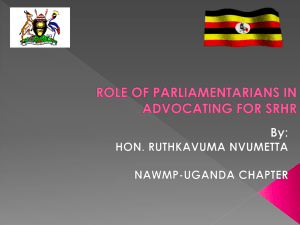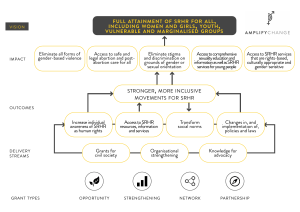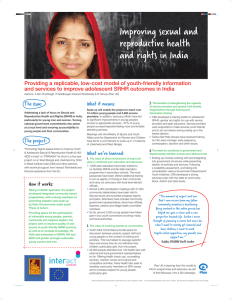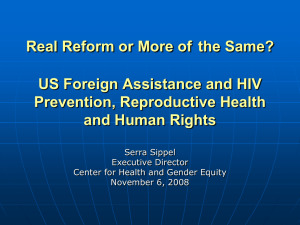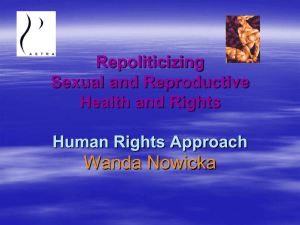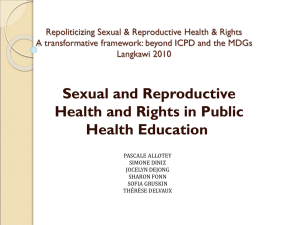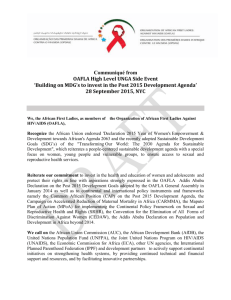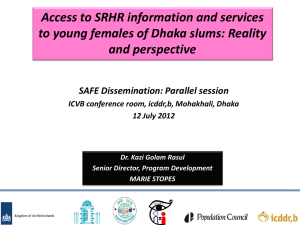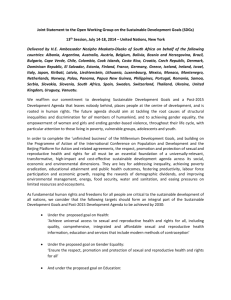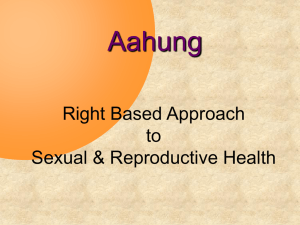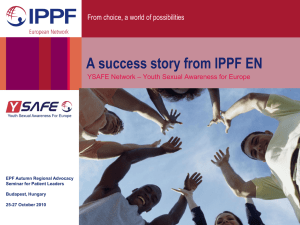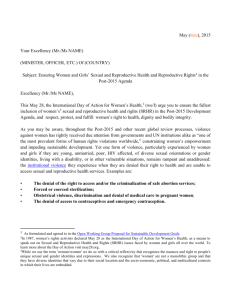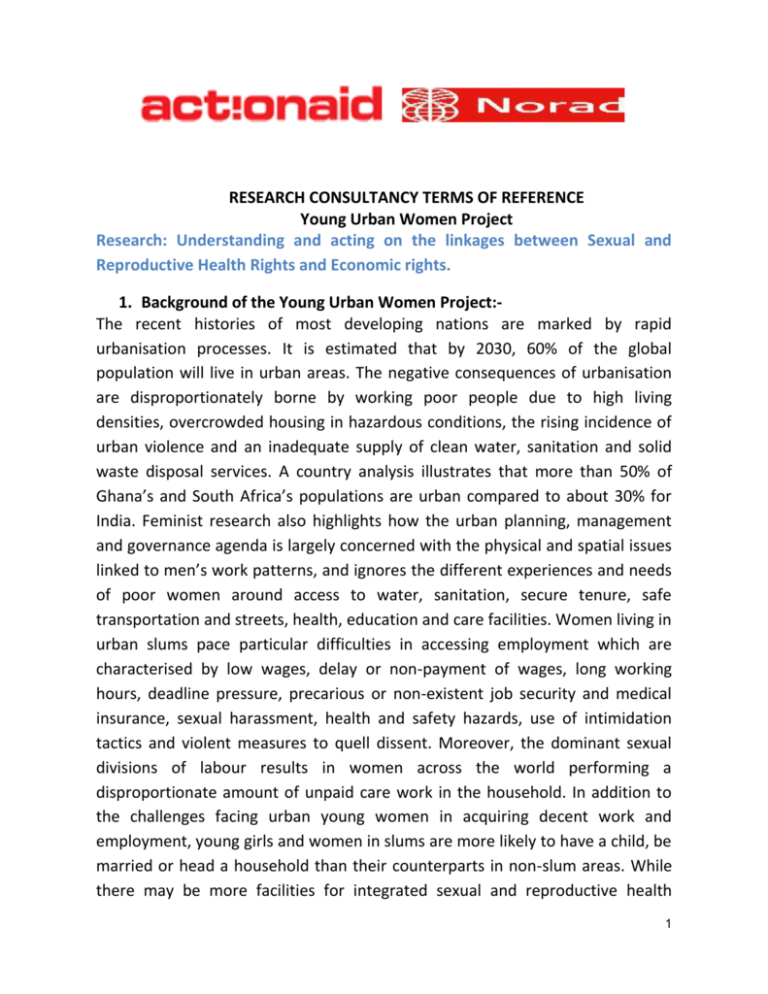
RESEARCH CONSULTANCY TERMS OF REFERENCE
Young Urban Women Project
Research: Understanding and acting on the linkages between Sexual and
Reproductive Health Rights and Economic rights.
1. Background of the Young Urban Women Project:The recent histories of most developing nations are marked by rapid
urbanisation processes. It is estimated that by 2030, 60% of the global
population will live in urban areas. The negative consequences of urbanisation
are disproportionately borne by working poor people due to high living
densities, overcrowded housing in hazardous conditions, the rising incidence of
urban violence and an inadequate supply of clean water, sanitation and solid
waste disposal services. A country analysis illustrates that more than 50% of
Ghana’s and South Africa’s populations are urban compared to about 30% for
India. Feminist research also highlights how the urban planning, management
and governance agenda is largely concerned with the physical and spatial issues
linked to men’s work patterns, and ignores the different experiences and needs
of poor women around access to water, sanitation, secure tenure, safe
transportation and streets, health, education and care facilities. Women living in
urban slums pace particular difficulties in accessing employment which are
characterised by low wages, delay or non-payment of wages, long working
hours, deadline pressure, precarious or non-existent job security and medical
insurance, sexual harassment, health and safety hazards, use of intimidation
tactics and violent measures to quell dissent. Moreover, the dominant sexual
divisions of labour results in women across the world performing a
disproportionate amount of unpaid care work in the household. In addition to
the challenges facing urban young women in acquiring decent work and
employment, young girls and women in slums are more likely to have a child, be
married or head a household than their counterparts in non-slum areas. While
there may be more facilities for integrated sexual and reproductive health
1
services in urban areas, they are not always accessible to working poor women
in slums. Building effective SRH services (such as family planning, safe pregnancy
and delivery, safe abortions, disease testing and so forth) does not feature
prominently in the urban planning and governance agenda. The opinions and
voices of urban poor, especially of young women are not reflected or sought in
the planning and implementation of urban SRH facilities. Therefore multiple
challenges persist in the urban context with regard to accessibility and
availability SRHR and economic empowerment of young women. Increasing
flexibilization and informalization of production and employment relationships
in the context of global competition has ensured that while young women
gradually get relegated to informal economy their access to quality and
affordable SRHR gets compromised due to the same economic forces leading to
privatisation of health care services.
Given the above context, the 3 year (2013-2016) multi-country “Young Urban
Women-Life Choices and Livelihoods” programme aims at empowering 5,800
young urban women living in poverty in seven cities in India, Ghana and South
Africa through more economic independence and control over their bodies, and
by ensuring that their voices are heard and recognised in local, national and
international forums. Rather than addressing SRHR or Decent Work and
livelihoods separately, the rights framework conceived for this project is
inclusive of young women’s economic, social and sexual empowerment. The
idea of inter-sectionality is important here; young women’s experiences of being
marginalised in one aspect of their lives are closely connected to other forms of
marginalisation as well. For instance, women concentrated in the informal
economy in precarious conditions of work are also often denied access to
education and SRH services.
The programme (supported by two donors-NORAD and the Human Dignity
Foundation) started in July 2013 across seven cities which are Accra and Tamale
in Ghana, Cape Town and Johannesburg in South Africa and Mumbai, Chennai
and Hyderabad in India.
Project goal:Our goal is that in three years, 5,800 young urban women living in poverty in
Ghana, India and South Africa will have greater dignity through more
2
economic independence and control over their bodies and their voices will be
heard and recognised in international forums.
Outcomes:Outcomes are the specific changes in young women’s lives that will be achieved
by the end of the three year programme and will assist us to achieve the
promised goal. The stated goal will be achieved if:
Outcome 1: Young women have safe and decent work and livelihoods,
and can exercise greater control over their income
Outcome 2: Young women's informed choices about their sexual and
reproductive health are increasingly realised
Outcome 3: Young women in the areas we programme in are
empowered and supported by allies and responsible stakeholders to effect
change in their own lives, their families, their communities and different levels
of government
2. Rationale for the proposed research:Action Aid’s experiences of conducting research and developing the programme
framework for this particular project shows that young women’s inability to
access SRHR services and reduce the burden of unpaid care work not only have
serious implications on her agency and well-being, but also impede her access to
paid work outside of the house and vice-versa. Similarly women’s engagement
in paid employment has not necessarily resulted in a significant change with
regard to their disproportionate responsibility for care work and household
chores. However these inter-linkages between young women’s access to Decent
Work, SRHR and unpaid care work have remained largely unexplored and
unaddressed. Similarly, development interventions with young women have
chosen to focus on either livelihoods or SRHR issues, existing in isolation from
each other. In the current global context of development of SDGs and Beijing
+20 processes, several discussions are currently taking place on situating
women’s rights in the over-arching SDG framework. Therefore, this seems like
the right time to call for an integrated approach on this, to generate evidence in
order to demand an integrated and reinforced state responsibility that would
3
acknowledge the inter-connections under the broader framework of women’s
human rights and a gendered approach to social justice. This would also be
essential to create stronger cross-movement linkages and consensus building
between labour rights movements, feminist organisations, agencies working on
SRHR, and youth organisations.
Objective of the research: To clearly establish the linkages between access to Decent Work, SRHR, and
unpaid care work and the need to have a comprehensive approach towards
young women’s empowerment processes.
To use the research findings to advocate for greater cross-movement
linkages and consensus building between organisations working on SRHR and
women’s economic rights, with a particular focus on young women.
To eventually facilitate the development of a small informal alliance of
agencies working on youth rights, SRHR, women’s rights, labour and
economic rights in order to conduct targeted advocacy aimed at relevant
global political actors.
Target audience:The research would be primarily aimed at civil society organisations working on
SRHR, women’s rights and feminist agencies, youth rights, women’s labour and
economic rights for consensus building around the comprehensive approach.
The research findings will be disseminated through an international workshop in
May next year. In the long run it will also be used for advocacy with key donors
that fund work on youth rights, employment and women’s rights, as well as with
emerging and existing regional policy institutions such as the AU and the BRICS.
This would be aimed at pushing for policies and funding structures that
acknowledge the inter-connections between SRHR and Economic Rights of
young women.
Proposed research methodology:The research would involve both primary and secondary modes of data
collection.
4
Primary data collection: - primary data would be collected at the community
level in all the 3 countries where the project is being implemented. Primary data
would mostly be collected through the use of qualitative and participatory tools.
Secondary data collection: - the three country and the global project baseline
reports, national policy review reports in the three project countries, and
relevant international laws, policies, conventions and resolutions would form
part of the secondary data collection process.
6. Purpose of the consultancy:
There will be two components of the research: international and national. At the
international level, the international researcher (already in place) will do the
following:
A) Lead the process for development of tools for primary data collection
from the three countries.
B) Provide guidance to the national researchers ensuring a high quality of
data collection.
The national researcher, under the guidance of the international researcher will
be expected to deliver the following outputs:
Over-all outputs:1. Community mapping of services
2. Participatory research into young women's understanding of and barriers to
intersection of bodily integrity, economic security and reduced burden of care,
though interviews, training and supervision of peer interviewers, FGDs, etc.
3. Secondary data collection on municipal expenditures for services related to
SRHR, work/livelihood opportunities for young women, key infrastructure
(water, sanitation and transportation), and creches.
Specific outputs:a. Field testing, piloting of the primary data collection tools.
5
b. Provide feedback to the international researcher on the above and
support the tool finalisation process.
c. Conduct primary data collection.
d. Review existing national, state and municipal level laws, programmes and
policies on Decent Work, Unpaid Care Work and SRHR for young urban
women to analyse inter-linkages between them.
e. Conduct literature review of any research work carried out on interlinkages in the respective country context.
f. Analyse and synthesize data and prepare report to be shared with
international researcher.
7. An outline of the proposed report:
The national report can have the following sections: Chapter 1:- review of existing global information that can shed light on
the inter-linkages.
Chapter 2:- key findings from the countries in terms of how SRHR and
unpaid care work impacts on decent work and livelihoods for young
women.
Chapter 3:- key findings from the countries in terms of how lack of
opportunity to engage in paid employment and/or access to decent work
opportunities impacts on women’s SRHR access and decision-making
(from the perspective of sexual autonomy and bodily integrity).
Chapter 4:- key recommendations for policy makers, and civil society
actors, and young people themselves.
8. Outcome of the consultancy:
The consultant is expected to produce a 30 page document (excluding
bibliography and annexes) highlighting the key findings from the desk research
and the primary data collection.
The consultant will be required to work 25 days in total. The proposed time-line
is below:6
Activity
Timeline
National
26th March,2015
researchers in place
Secondary data
27th to 17th April, 2015
collection/literature
review
Research workshop 1st week of April (TBA)
with three national
consultants
Field level data
1st to 30th April
collection
Finalisation of
1st to 20th May
national level
report
Finalisation of
21st May to 21st June
International report
8. Location: Accra and Tamale
The consultant will be required to undertake travel to the project areas to
undertake data collection.
9. What materials/information is to be provided to the consultant?
ActionAid will provide the consultant with the full country reports from Ghana,
India and South Africa to update and build on. Some of these reports had some
gaps, so the role of the consultant will be both to provide more current data
when available and to fill in the gaps in the report identified by ActionAid
member countries.
10. Copyright/Confidentiality: AAI will retain copyright status of the output
resources and any additional documentation or information gathered during
the consultancy period. Approval by AAI will be required before the material
can be released for reproduction in any format.
7
11. Minimum qualification
a. Advanced in Gender Studies/ Reproductive health rights / labour rights and
labour law with at least 5-7 years of research in women rights and SRHR
issues
b. The candidate should have proven research experience in sexual reproductive
health and right issues in relation to youth
c. The candidate should have sound experience in evaluation and assessment
of sexual reproductive health and right services and systems with regards to
youth
12. Mode of application
Expression of Interest (EoI) with detailed budget should be submitted to:
jobs.ghana@actionaid.org or ActionAid Ghana Accra Office, H/No. 13 La
Tebu Street, East Cantonments by 22nd March, 2015
8

